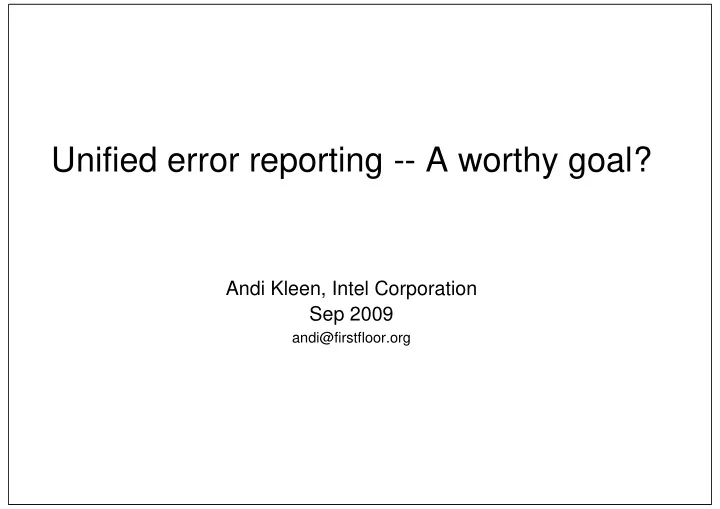

Unified error reporting -- A worthy goal? Andi Kleen, Intel Corporation Sep 2009 andi@firstfloor.org
errors standardized errors machine checks pci-express errors platform errors thermal errors APEI storage errors IO errors SMART events network�errors link lost random errors from drivers failover software errors out of memory
scope concentrating on platform hardware errors for now the others possibly later but especially software errors are hard because there are so many of them
what can you do with errors: log them categorize them: display critical ones on the desktop as pop up account them, keep statistics that many errors on device X in last 24hours trigger events e.g. when more than X errors in 24h call this shell script which pages admin, support, triggers failover or on a small home servers starts blinking the red LED (after all what else is the "LED subsystem" good for?)
audiences desktop user normal system administrator expert automated analysis tool cluster logging
the desktop user don’t really understand errors at best a very high level summary should not be unnecessarily concerned needs classification, hiding graphical interface localization details should still be available for expert support
normal system administrator largely same as desktop user only really needs high level summary should not be unnecessary alarmed really wants to identify failed part graphical interface not as important can access log files but still useful if not intrusive needs reporting to the console
expert / automatic tools compatibility crucial still want high level summary but all the details should be available interface to other tools might put error from a cluster in central database
so what’s wrong with printk? difficult to parse good errors are verbose printk is traditionally for 1-2 lines most printks with more information are a mess no clear record boundaries categorization / severity important good errors too verbose for kernel log
what’s good with printk it’s the standard a lot of people know where to look there are lots of tools to handle it including network servers but often not very good should be used for some high level categorization but only those errors that don’t make sense to hide
error metadata hardware errors ultimative goal is to identify the failed part various other information various other data useful for example dropped event count advantage of standard records they tend to be reasonably well documented so you can point sophisticated users to documents make it easier to process rich errors are important need more data per error but don’t display it all by default
why should some errors be hidden? some "errors" are normal and expected if you ever saw a noisy SMART daemon... or ECC memory has a expected corrected error rate let’s call them events they’re not really errors hardware errors are often bursty but individual events in a burst not too interesting and on large clusters too much data they’re still useful to see trends and should be accounted per component don’t belong in normal kernel logs
error processing good error processing needs a lot of state and also policy GUI interfaces for important errors or triggering events with triggers when exceeding thresholds complex decoding identifying components using firmware help probably not a good idea in the kernel one corner case is fatal errors where the kernel has to panic the kernel needs to do limited decoding at least but most errors are not fatal need user space for rich error processing we already have it with klogd/syslogd just too dumb
errors vs event tracing normal event tracing aimed at debugging so higher overhead is ok error handling should be always on has to work seamlessly in the background small footprint crucial particularly in memory and in dependencies requirements and tools are quite different should not be mixed up possibly reuse some infrastructure but only if it has extremly low overhead
so what’s the master plan? right now for platform errors (MCE, APEI, PCI-AER) keep basic one line errors in printk with an identifier but only for serious errors or occasionally output for trends strictly rate limited possibly extend KERN_* for severity but add structured record on second channel similar to /dev/mcelog, but ascii in sysfs few record types for different types using standard formats (e.g. CPER)
master plan user space a standard error daemon light weight to always run has knowledge over basic error types accounts events hooks for automated action simple network protocol interfaces extension of mcelog for more errors PCI errors, APEI more in the future?
mcelog Machine Check CE memory error Other CPU errors UC memory error MCE decoding CE threshold Per Socket tracking Per DIMM accounting Per core accounting UC threshold Force offline page/kill Global log file CE Trigger Socket Threshold DIMMThreshold Local socket protocol RCThreshold UC Trigger Socket Trigger DIMM Trigger Reporting client RC Trigger
Questions?
Backup
kernel error problems some happen from NMI like contexts have to use lockless data structures can cause problems like livelocks requires preallocation, potentially wasting a lot of memory
Recommend
More recommend